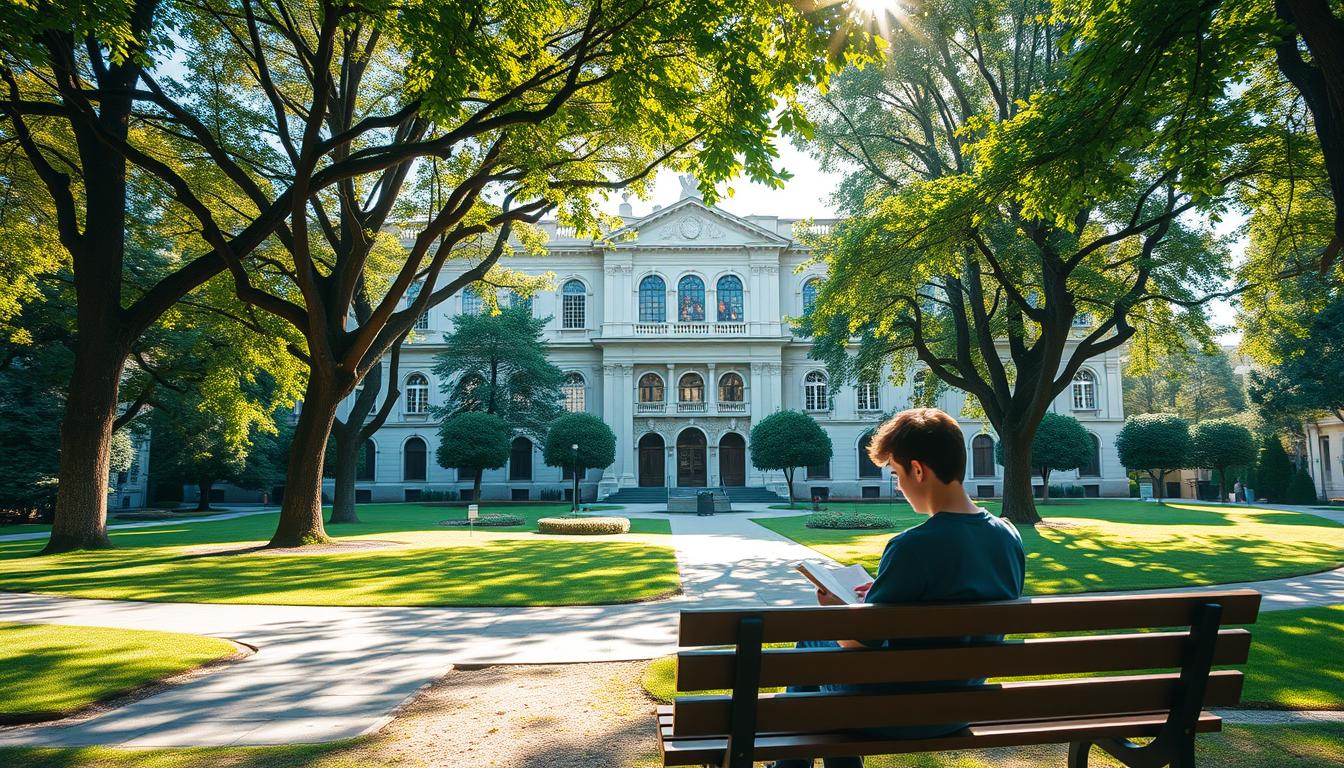International students seeking financial support for their studies can explore government-funded opportunities in Europe.
The Dutch Ministry of Education, along with participating universities, offers partial funding for eligible candidates. A key benefit includes an initial payment of €5,000, helping cover first-year expenses.
Anúncios
Understanding eligibility criteria and deadlines is crucial for a successful application. The 2025-2026 academic cycle brings updates, so staying informed ensures no missed opportunities. Over 30 institutions, including research and applied sciences universities, participate in this program.
Prospective applicants should review requirements early. Proper preparation increases the chances of securing financial aid for their educational journey.
For more information, explore the official scholarship website mentioned in this article:
You will be redirected to another website
Introduction to Netherlands Scholarships
The Dutch education system opens doors for talented learners worldwide through financial aid programs. These initiatives reflect the country’s commitment to global education, particularly for non-EEA nationals pursuing bachelor’s or master’s degrees.
A strategic partnership between the government and academic institutions ensures diverse opportunities. South African students, for example, benefit from EU-quality education with reduced financial barriers.
Participating institutions include research universities and applied sciences schools. Each offers unique programs tailored to industry needs and academic excellence.
Early preparation is key for the 2025-2026 application cycle. Understanding requirements and deadlines maximizes success in securing these competitive awards.
What Are Netherlands Scholarships?
The Dutch Ministry of Education supports international learners through structured funding initiatives. These programs aim to attract top talent to research and applied sciences institutions. Collaboration with Nuffic ensures smooth administration and fair distribution of funds.
Overview of Ministry-Funded Programs
Two primary awards are available for the 2025-2026 cycle. The NL Scholarship offers €5,000, paid in two installments of €2,500 per semester. Honors Scholarships range from €2,500 to €7,500, rewarding academic excellence.
Types of Scholarships Available
Eligibility varies by institution and program type. Research universities like Delft TU focus on STEM fields, while applied sciences schools such as HAN emphasize practical training. Specialized options exist for arts students at venues like Amsterdam University of the Arts.
| Scholarship Type | Amount | Payment Structure | Institution Focus |
|---|---|---|---|
| NL Scholarship | €5,000 | €2,500 per semester | All participating universities |
| Honors Scholarship | €2,500–€7,500 | One-time or installment | Research-focused institutions |
Prospective applicants should verify deadlines and requirements with their chosen school. Early preparation increases approval chances for these competitive awards.
Eligibility Criteria for Netherlands Scholarships
Applicants must meet specific conditions to qualify for funding in Dutch higher education. These rules ensure fairness and prioritize candidates who align with the program’s goals.
Nationality and Residency Rules
Only non-EEA nationals may apply. Dual citizens with EEA status are ineligible. Proof of citizenship, like a passport, is mandatory.
South African students must provide documented evidence of their nationality. Visa holders should confirm their residency status matches the criteria.
Academic Program Conditions
Full-time enrollment in bachelor’s or master’s programs is required. Each institution sets minimum scores, such as IELTS 6.5 or TOEFL 90.
Some schools demand a GPA of 3.0 or higher. Research-focused universities often have stricter requirements than applied sciences institutions.
Prior Education Restrictions
Holders of Dutch degrees cannot apply. This includes diplomas from vocational or university-level programs in the country.
Transcripts from previous studies must show no completed education in the Netherlands. Exceptions are rare and require special approval.
Financial Benefits of Netherlands Scholarships
Financial aid for international education significantly reduces study expenses. These awards help cover partial costs, easing the burden for learners from non-EEA countries. South African applicants, for example, can allocate funds more efficiently with upfront support.
Scholarship Amounts and Coverage
The NL Scholarship provides €5,000, split into two installments. Larger awards, like HAN’s €12,500 maximum, cover more expenses. Here’s how funds are typically allocated:
- Tuition: 20–50% of annual fees (e.g., €10,000 at HAN).
- Living costs: €15,000 annually for housing, food, and transport.
- Payment timing: Disbursed in November and April.
Balancing Tuition and Living Costs
Most awards are non-renewable, requiring careful budgeting. Students outside the EEA should plan for remaining costs early. Pro tip: Use the initial €2,500 installment for housing deposits.
“Partial funding bridges the gap, but additional savings or part-time work may be needed.”
Research universities often offer higher amounts than applied sciences schools. Multi-year awards are rare but available at select institutions.
Participating Universities and Institutions
Students can choose from prestigious research universities or career-focused applied sciences schools. Over 30 institutions participate in the 2025-2026 academic year, offering tailored programs for international learners.
Research Universities
These institutions emphasize theoretical study and innovation. Top options include:
- TU Delft – Leading in engineering and technology.
- Erasmus University Rotterdam – Renowned for business and economics.
- Utrecht University – Strong in humanities and sciences.
Maastricht University also stands out for its problem-based learning approach. Annual updates may affect program availability.
Universities of Applied Sciences
Practical training and industry connections define these schools. Notable examples:
- HAN University – Offers up to €12,500 for top applicants.
- Hotelschool The Hague – Specializes in hospitality management.
- Codarts Rotterdam – Focused on performing arts.
“Applied sciences schools bridge classroom learning with real-world skills.”
Amsterdam University of the Arts caters to creative fields. Prospective students should verify annual participation lists.
Step-by-Step Application Process
Navigating the application process for financial aid requires careful planning and attention to detail. Each institution has unique steps, but core components remain consistent across programs.
Preparing Your Documents
Gather these materials early to avoid last-minute delays:
- Academic transcripts: Certified translations for non-English records.
- Test scores: IELTS (6.5+) or TOEFL (90+) for language proficiency.
- South African applicants: SAQA certification for prior qualifications.
HAN University additionally requires a 3-minute video introduction. Check each school’s website for specific requirements.
Writing a Strong Motivation Letter
A compelling letter highlights two key areas:
- Academic goals: Align your ambitions with the program’s focus.
- Cultural contribution: Explain how you’ll enrich campus diversity.
“Admissions committees look for authenticity—avoid generic templates.”
Submitting Your Application
Most universities use online portals, like Erasmus University’s faculty-specific system. Double-check these details:
- Submission deadline: Typically 1–3 months before the semester starts.
- Video formats: MP4 or MOV, under 100MB for HAN.
- Confirmation emails: Save these for tracking.
Key Deadlines for Netherlands Scholarships
Meeting application deadlines is crucial for securing financial aid in the upcoming academic year. Institutions enforce strict cutoff dates, and late submissions risk automatic disqualification.
Institution-Specific Timelines
Deadlines vary by school and program type. For example:
- HAN University: April 1 (September intake) or October 1 (February intake).
- Erasmus University: Closed for 2025–2026 applications.
- Rolling deadlines: Some schools review applications until slots fill.
Tips for Timely Submission
Follow these steps to avoid last-minute issues:
- Start document authentication 8 weeks ahead (e.g., SAQA for South Africans).
- Account for time zones when submitting online.
- Set reminders for each institution’s cutoff.
“A well-planned timeline reduces stress and boosts approval chances.”
September intakes often have earlier deadlines than February starts. Confirm dates directly with your chosen school.
Post-Application Steps
After submitting an application, students should focus on monitoring their admission status. Universities typically take 4–8 weeks to review materials. HAN, for example, notifies candidates by 1 June or 3 November, depending on the intake.
Tracking Your Application Status
Most institutions provide updates via online portals. Keep login credentials secure and check weekly. Delays may occur if additional information is requested.
Key actions during this phase:
- Enable email notifications for portal alerts.
- Respond promptly to verification requests.
- Confirm receipt of documents if no update appears.
Accepting the Scholarship Award
Successful applicants receive digital award letters. Acceptance often requires:
- Signing an online confirmation within 14 days.
- Providing visa application documents (e.g., passport copies).
- Setting up a Dutch bank account for fund disbursement.
“Timely acceptance ensures reserved funds aren’t reallocated to waitlisted candidates.”
South African students should note bank account requirements, including IBAN compatibility. Post-acceptance, universities guide visa processes.
Additional Resources for Applicants
Reliable resources help applicants navigate the complexities of studying abroad efficiently. From official portals to housing solutions, these tools ensure a smooth transition after approval.
Official Websites and Contacts
The Study in NL website offers updated details on accredited institutions. Nuffic’s integrity guidelines outline ethical standards for participants in the programme.
Key contacts include:
- Nuffic Helpdesk: Clarifies Code of Conduct requirements.
- University International Offices: Provide course-specific information.
Visa and Accommodation Guidance
South African students must submit a visa documentation checklist, including proof of financial means. Health insurance is mandatory before arrival.
| Resource | Purpose | Notes |
|---|---|---|
| SSH Housing | Student apartments | Book 4–6 months ahead |
| Stadswonen Rotterdam | Affordable rentals | Requires local registration |
“Pre-departure orientation programs ease cultural adjustment—attend one if available.”
Most universities partner with insurers like AON for compliant coverage. Confirm deadlines to avoid delays.
Common Mistakes to Avoid
A 32% rejection rate highlights common pitfalls in financial aid applications. Many candidates miss out due to easily fixable errors. Understanding these missteps improves chances of approval when you apply scholarship programs successfully.
Incomplete Applications
Unsigned forms or uncertified translations top the list of oversights. Some schools demand notarized academic records, while others reject applications lacking program-specific essays.
Financial declarations must match bank statements precisely. South African students should triple-check institution-specific requirements, like HAN’s video submission rule.
Missing Deadlines
Late submissions account for nearly a third of rejections. Research universities often close portals earlier than applied sciences schools.
Set reminders for each deadline, accounting for time zones. Early preparation avoids last-minute issues with document authentication or recommendation letters.
Conclusion
Partial funding provides crucial support for academic aspirations abroad. For the 2025-2026 cycle, early preparation and attention to detail remain key to securing awards. Students should review requirements thoroughly and leverage official portals for accurate updates.
Remember, most awards cover only part of study costs. Budget wisely and explore additional funding options if needed. Unique deadlines and criteria this year require extra vigilance.
Start gathering documents now—certified transcripts, test scores, and motivation letters take time. Official resources like Nuffic’s guidelines simplify the process. Take action today to turn educational goals into reality.
FAQ
Who can apply for Dutch Ministry-funded scholarships?
Non-EEA students pursuing bachelor’s or master’s degrees at participating institutions can apply. Specific eligibility depends on the program.
What expenses do these scholarships cover?
Most awards include partial tuition waivers and living cost stipends. Full coverage varies by institution and degree level.
Which universities participate in the 2025-2026 scholarship programs?
Both research universities (like Leiden and Delft) and applied sciences institutions (such as HAN and Fontys) are included.
When is the application deadline for these awards?
Deadlines differ per university but typically fall between January and May for the upcoming academic year.
Can I apply if I already started my degree in the Netherlands?
No, these scholarships are only for new international students beginning their studies.
How competitive are these funding opportunities?
Selection is merit-based with high competition. Strong academic records and compelling motivation letters improve chances.
Do I need to apply separately for admission and the scholarship?
Yes, you must secure admission first. Some universities allow concurrent applications.
Where can I find official scholarship information?
The Dutch Ministry of Education website and university international offices provide updated details.
What documents are required for the application?
Typically needed: academic transcripts, CV, recommendation letters, passport copy, and study plan.
How will I know if my application succeeds?
Universities notify selected candidates via email, usually within 8-12 weeks after deadlines.






